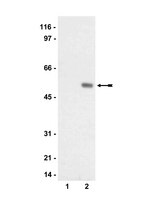Phase II trial of temsirolimus in patients with metastatic breast cancer.
Gini F Fleming,Cynthia X Ma,Dezheng Huo,Husain Sattar,Maria Tretiakova,L Lin,Olwen M Hahn,F O Olopade,R Nanda,Philip C Hoffman,M J Naughton,Timothy Pluard,Suzanne D Conzen,Matthew J Ellis
Breast cancer research and treatment
136
2012
Show Abstract
Preclinical models suggested that activating mutations of the PIK3CA gene are associated with sensitivity to inhibitors of the mammalian target of rapamycin (mTOR). In breast cancers, PIK3CA mutations are associated with estrogen receptor (ER) positivity. We therefore performed an open-label single arm phase II study of the rapamycin analog, temsirolimus, at a dose of 25 | | 22245973
 |
Sustained postexercise increases in AS160 Thr642 and Ser588 phosphorylation in skeletal muscle without sustained increases in kinase phosphorylation.
Schweitzer, GG; Arias, EB; Cartee, GD
Journal of applied physiology (Bethesda, Md. : 1985)
113
1852-61
2012
Show Abstract
Prior exercise by rats can induce a sustained increase in muscle Akt substrate of 160 kDa (AS160) phosphorylation on Thr(642) (pAS160(Thr642)). Because phosphorylation of AS160 on both AS160(Thr642) and AS160(Ser588) is important for insulin-stimulated glucose transport (GT), we determined if exercise would also induce a sustained increase in pAS160(Ser588) concomitant with persistently elevated pAS160(Thr642) and GT. Given that the mechanisms for sustained postexercise (PEX) effects on pAS160 were uncertain, we also studied the four kinases known to phosphorylate AS160 (Akt, AMPK, RSK, and SGK1). In addition, because the serine/threonine phosphatase(s) that dephosphorylate muscle AS160 were previously unidentified, we assessed the ability of four serine/threonine phosphatases (PP1, PP2A, PP2B, and PP2C) to dephosphorylate AS160. We also evaluated exercise effects on posttranslational modifications (Tyr(307) and Leu(309)) that regulate PP2A. In isolated epitrochlearis muscles from rats, GT at 3hPEX with insulin significantly (P less than 0.05) exceeded SED controls. Muscles from 0hPEX vs. 0hSED and 3hPEX vs. 3hSED rats had greater pAS160(Thr642) and pAS160(Ser588). AMPK was the only kinase with greater phosphorylation at 0hPEX vs. 0hSED, and none had greater phosphorylation at 3hPEX vs. 3hSED. Each phosphatase was able to dephosphorylate pAS160(Thr642) and pAS160(Ser588) in cell-free assays. Exercise did not alter posttranslational modifications of PP2A. Our results revealed: 1) pAMPK as a potential trigger for increased pAS160(Thr642) and pAS160(Ser588) at 0hPEX; 2) PP1, PP2A, PP2B, and PP2C were each able to dephosphorylate AS160; and 3) sustained PEX-induced elevations of pAS160(Thr642) and pAS160(Ser588) were attributable to mechanisms other than persistent phosphorylation of known AS160 kinases or altered posttranslational modifications of PP2A. | | 22936728
 |
The role of SGK and CFTR in acute adaptation to seawater in Fundulus heteroclitus.
Shaw, JR; Sato, JD; VanderHeide, J; LaCasse, T; Stanton, CR; Lankowski, A; Stanton, SE; Chapline, C; Coutermarsh, B; Barnaby, R; Karlson, K; Stanton, BA
Cellular physiology and biochemistry : international journal of experimental cellular physiology, biochemistry, and pharmacology
22
69-78
2008
Show Abstract
Killifish are euryhaline teleosts that adapt to increased salinity by up regulating CFTR mediated Cl(-) secretion in the gill and opercular membrane. Although many studies have examined the mechanisms responsible for long term (days) adaptation to increased salinity, little is known about the mechanisms responsible for acute (hours) adaptation. Thus, studies were conducted to test the hypotheses that the acute homeostatic regulation of NaCl balance in killifish involves a translocation of CFTR to the plasma membrane and that this effect is mediated by serum-and glucocorticoid-inducible kinase (SGK1). Cell surface biotinyation and Ussing chamber studies revealed that freshwater to seawater transfer rapidly (1 hour) increased CFTR Cl(-) secretion and the abundance of CFTR in the plasma membrane of opercular membranes. Q-RT-PCR and Western blot studies demonstrated that the increase in plasma membrane CFTR was preceded by an increase in SGK1 mRNA and protein levels. Seawater rapidly (1 hr) increases cortisol and plasma tonicity, potent stimuli of SGK1 expression, yet RU486, a glucocorticoid receptor antagonist, did not block the increase in SGK1 expression. Thus, in killifish SGK1 does not appear to be regulated by the glucocorticoid receptor. Since SGK1 has been shown to increase the plasma membrane abundance of CFTR in Xenopus oocytes, these observations suggest that acute adaptation (hours) to increased salinity in killifish involves translocation of CFTR from an intracellular pool to the plasma membrane, and that this effect may be mediated by SGK1. | Western Blotting | 18769033
 |
Serum and glucocorticoid-inducible kinase (SGK) is a target of the PI 3-kinase-stimulated signaling pathway.
Park, J, et al.
EMBO J., 18: 3024-33 (1999)
1999
Show Abstract
Serum and glucocorticoid-inducible kinase (SGK) is a novel member of the serine/threonine protein kinase family that is transcriptionally regulated. In this study, we have investigated the regulatory mechanisms that control SGK activity. We have established a peptide kinase assay for SGK and present evidence demonstrating that SGK is a component of the phosphoinositide 3 (PI 3)-kinase signaling pathway. Treatment of human embryo kidney 293 cells with insulin, IGF-1 or pervanadate induced a 3- to 12-fold activation of ectopically expressed SGK. Activation was completely abolished by pretreatment of cells with the PI 3-kinase inhibitor, LY294002. Treatment of activated SGK with protein phosphatase 2A in vitro led to kinase inactivation. Consistent with the similarity of SGK to other second-messenger regulated kinases, mutation of putative phosphorylation sites at Thr256 and Ser422 inhibited SGK activation. Cotransfection of PDK1 with SGK caused a 6-fold activation of SGK activity, whereas kinase-dead PDK1 caused no activation. GST-pulldown assays revealed a direct interaction between PDK1 and the catalytic domain of SGK. Treatment of rat mammary tumor cells with serum caused hyperphosphorylation of endogenous SGK, and promoted translocation to the nucleus. Both hyperphosphorylation and nuclear translocation could be inhibited by wortmannin, but not by rapamycin. | | 10357815
 |












